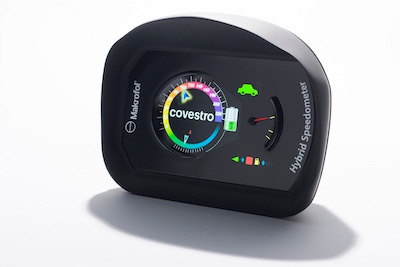Covestro focuses on mobility of tomorrow at VDI Congress Plastics in Automotive Engineering with innovative and functional material solutions based on polycarbonate.
April 1, 2019

At the VDI Congress Plastics in Automotive Engineering (PIAE) on April 3rd and 4th in Mannheim, Germany, Covestro will be focusing on a new priority topic: the car interior – in line with the motto “Designing Today for the Passengers of Tomorrow.” Due to their outstanding properties, polycarbonate and its blends will play an important role in car interiors but will also be a key material for future mobility solutions in general; for example, in the exterior shell and in the powertrain according to Covestro.
|
2019-033-1 At the VDI Congress „Plastics in Automotive Engineering“, Covestro will be focusing on the car interior as a new priority topic, presenting new polycarbonate blends as well as film solutions. |
|
2019-033-2.jpg A current trend are hybrid speedometers, which bridge the gap between previous analog combination instruments and future purely digital display solutions for display instruments. The three-dimensional surface of this speedometer consists of Makrofol LM polycarbonate film from Covestro. |
“At our booth, visitors can use VR glasses and videos to get an idea of what mobility could look like in the year 2030,” explains Jochen Hardt from global mobility marketing at Covestro. The Sample Bar also invites visitors to touch and feel a lot of samples – “an ideal opportunity to learn about the fascinating properties of today’s plastics,” says Jochen Hardt.
At the PIAE Congress, the company will present three new polycarbonate blends, which meet the different requirements for use in car interiors. For example, the PC/ABS (acrylonitrile-butadiene-styrene) blend Bayblend T85 XAT is anti-static and provides permanent dust-free interior paneling – in accordance with specifications of major car manufacturers. In addition, it is resistant to UV radiation and offers property improvements and cost benefits compared with the previous standard product PC+ASA (acrylonitrile-styrene-acrylate).
The property profile of Bayblend T85 XUV features permanent light stability, excellent impact strength and low emissions of volatile organic components (VOC). Meanwhile, the PC+PBT (polybutylene terephthalate) blend Makroblend SR60 provides good mechanical properties and cost advantages, primarily in applications with high-gloss surfaces without a coating.
A current trend is hybrid speedometers, which bridge the gap between previous analog combination instruments and future purely digital display solutions for display instruments. According to studies, these hybrid solutions may dominate the global automotive market by 2025.
At the VDI Congress, Covestro will present a hybrid speedometer with a black-panel and fade-out effect and precision-controlled light functions. The three-dimensional surface of the instrument consists of Makrofol LM polycarbonate film from Covestro and was manufactured using high-pressure forming (HPF); backlit symbols are seamlessly integrated. The film offers design freedom and allows functional integration of digital and analog elements. The housing was made of thermoplastic polyurethane (TPU) using a 3D printer.
Covestro has many years of experience in developing polycarbonate materials for encapsulating batteries for laptops and other electronic devices. Lithium-ion batteries will also be the core component in future electric and hybrid vehicles. The company has developed various polycarbonate blends for these that meet the complex requirements and are also extremely impact-resistant over a wide temperature range – especially at sub-zero temperatures. They are suitable for battery modules, cell holders, crash absorbers and other products.
At the VDI Congress, for example, Covestro will present an Alta Pack battery from California’s e-bike specialist Alta Motors. It is encased in a housing made of the extremely impact-resistant PC+PBT blend Makroblend. The company helps its customers develop new products by providing technical services, e.g. with rheological, mechanical and thermal simulations for optimizing the injection molding process.
About the Author(s)
You May Also Like






